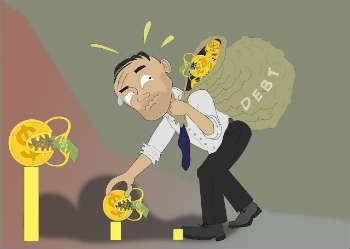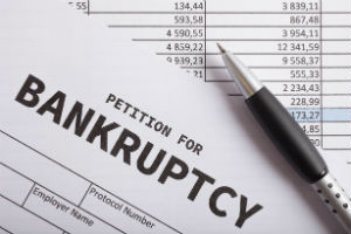When you file chapter 7 bankruptcy in Pennsylvania, all of your unsecured debts are completely eliminated; this is to say, they do not require repayment.
The types of debts that are erased are credit card, utility, medical, dental, payday, repossession, sheriff sale, judgments, etc. On the other hand, debts such as student loans, unfortunately, are not eliminated.
How Do I Know If I Qualify For Bankruptcy?
Our office will analyze your income and many other factors including your expenses and needs of your family to determine if you qualify. If you do, you will receive a discharge of your debts, you will keep all of your assets and you will be on your way to a new financial start.
Debt is often a fact of life. According to a study conducted by the Pew Charitable Trusts, eight out of 10 people carry some type of debt with the most common debt being a mortgage. It also found that this debt is not limited to young people just starting out. People are increasingly taking on debt later in life. While debt is a burden for many, others view it as a necessity.
Can You File For Chapter 7 Bankruptcy Without A Lawyer In PA?
But, what happens when this debt gets out of control and becomes an impossible burden? If this happens to you, perhaps a bankruptcy petition can help you finally get the creditors off your back.
You are not required to hire a lawyer specialized in bankruptcy laws, or any legal representative for that matter if you’re looking to pursue file for bankruptcy.
However, the process of filing can be incredibly complex and laborious for a person without experience. It involves seemingly endless forms, fees, going to bankruptcy court, filing critical documents within specific timeframes, attending meetings with creditors and more. It is also likely that you will have to take credit counseling and bankruptcy courses.
Specific laws in the State of Pennsylvania dealing with Chapter 7 can change often and without notice. For this reason, seeking out an experienced Chapter 7 bankruptcy lawyer in PA can prove invaluable in the long run.
What Happens If I File For Chapter 7 Bankruptcy In PA?
Receive A Clean Slate
While a Chapter 7 cannot discharge certain types of debt, such as child support, alimony, student loans, taxes, and fraudulent debts, it can discharge common debts including credit card debt, medical bills and other unsecured debt.
Those seeking a Chapter 7 or even Chapter 13 bankruptcy are often in heavy debt and have little assets. Filing for bankruptcy may wipe out all this debt, prevent creditors from contacting you, and finally giving you the fresh start you want.
Keep Your Home And Car
You might hear the word bankruptcy and think that means you will automatically lose your home, car and any other large assets you own. This is not true.
To keep these assets, you will be required to sign a Reaffirmation Agreement which basically states that you cannot file bankruptcy for those assets for eight years and you must repay those debts.
In order to sign a Reaffirmation Agreement, such debts must be current. Therefore, if you are three months behind, bankruptcy laws require that you make the debt current via payments. You can also exempt certain property and protect it from creditors once you file for Pennsylvania bankruptcy. State bankruptcy laws allow you to use the federal exemption statutes versus Pennsylvania exemptions; you can read more about filing exemptions here.
No Minimum Debt Requirement
With a Chapter 7 bankruptcy, you don’t have to have a certain amount of debt. You may file in a bankruptcy court with as little or as much debt as you prefer.
People with a heavy debt load might be trying to discharge several thousands of dollars while others have a few credit cards they feel will be impossible to pay back. Both of these exemplary persons may benefit from filing.
Speedy Process
You might have been facing debt issues for years, and your debt likely did not accumulate overnight. However, the good news is that when filing a bankruptcy petition, the process is surprisingly fast. Most cases can be resolved and closed within three to six months from start to finish.
Stop Creditor Calls And Garnishments
If creditors are worrying you with constant phone calls demanding immediate payment, filing for bankruptcy will stop those calls.
 Once you file for bankruptcy, all the creditors included in the claim will receive a notice that you have filed for bankruptcy at which point they must cease communication with you.
Once you file for bankruptcy, all the creditors included in the claim will receive a notice that you have filed for bankruptcy at which point they must cease communication with you.
You will also protect your wages from garnishment. Creditors might have a judgment against you in bankruptcy court, but they will no longer be able to garnish your wages.
While no one likes debt or wants to be in a situation where repayment seems impossible, it happens. It is so easy to use credit for large purchases when it is so readily available and easy to attain. But, the situation becomes difficult when it’s time to repay.
Bankruptcy Attorney in Media, Pennsylvania
If you’re drowning in a sea of debt, then you should consider filing for bankruptcy. Starting that process also comes with having a good bankruptcy attorney in DelCo who can provide legal advice.
Jeanne Marie Cella, Esq is the right attorney for you if you are looking to start fresh and are located in the Media and Delaware County area.
From there on your focus should then be to use credit wisely. Be responsible and reasonable with the amount of debt you acquire by determining beforehand if you can afford to repay the debt. Some people prefer to use cash and live by the philosophy that if they cannot afford to pay for it on the spot, then they can’t afford it. That same thought process may serve you well.
